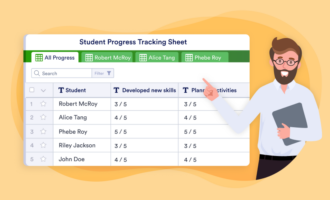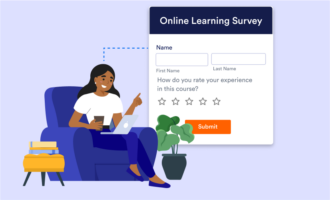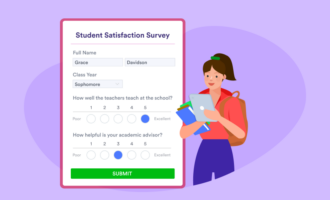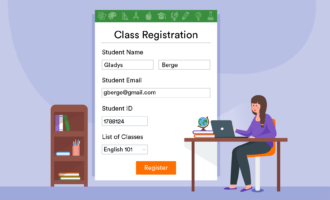Top parent engagement strategies in school
- Provide resources to support families
- Encourage parents to share information
- Host regular parent-teacher conferences
- Hold events to address educational challenges
- Consider language and cultural barriers
- Accommodate parent schedules
- Employ simple-to-use tech tools
- Recommend home-learning activities
- Create volunteer opportunities
- Establish an accessible communication plan
- Host a family night or fun activity
- Share positive information
Parent involvement in a child’s education is a key predictor of student success. According to the Centers for Disease Control and Prevention (CDC), parent engagement in school leads to better student behavior, increased academic achievement, and improved social skills. It also decreases the likelihood that children will engage in unhealthy behaviors like substance use.
In fact, parent engagement in school enhances the entire classroom community, helping all students succeed.
Other benefits of effective parent participation include
- Higher graduation rates
- Increased homework completion rates
- Increased levels of self-esteem
- Decreased likelihood of problematic behavior outside of school
- Greater involvement in school and other activities
- Increased teacher morale
- Reduced achievement gaps between groups of students, regardless of socioeconomic, ethnic, or racial background
Parent engagement defined
Parent engagement includes parents and school staff. Parents are proactively involved in their children’s education, and the school and its staff actively work with parents to support the learning and development process for students.
Common challenges with parent engagement
While most parents want to participate in their children’s education, it can be challenging for a number of reasons.
Common obstacles to better parent engagement include
- Inaccessibility, such as school communications that are only available via computer or only in one language
- Fractured communication via multiple sources and platforms, resulting in parents potentially missing key information
- Unclear communication, such as information filled with academic jargon that parents may not understand
- Language barriers and cultural differences that make communication between parents and schools challenging
- Lack of clarity around expectations, such as parents not understanding why their participation is necessary for student success
- Parental time constraints due to work commitments or family caregiving responsibilities, leaving little time to engage in their children’s education
- Limited resources, such as transportation or internet access, making it difficult to participate in school activities or to access important information
Strategies to foster parent engagement
Here are 12 parent engagement strategies to help increase parent involvement, create a more supportive learning environment, and improve educational outcomes.
1. Provide resources to support families
Offer workshops and training sessions for parents on homework help, college planning, and ways to take an active role in their children’s education. Hold workshops to train parents and guardians on the technology your school uses for regular communication, keeping in mind that not all families have access to smartphones or the internet.
Consider sharing information about community resources, such as GED and adult literacy courses, language courses, and social services like food banks.
2. Encourage parents to share information about their children
Invite parents to share information about their children that will help you better understand how to help them succeed in the classroom. This includes things like
- The support system they have at home
- Circumstances like illnesses, divorce, or other challenges that could affect a child’s behavior
- The child’s strengths and weaknesses, personality traits, any behavior issues, and the child’s learning style and study habits
- Anything else that will help in understanding each student’s needs
3. Host regular parent-teacher conferences
A regularly scheduled parent-teacher conference is the ideal venue for sharing a student’s academic progress — where they’re excelling and where they need to improve — but it’s also a great opportunity to organically gather the information mentioned in no. 2 above. Parents and teachers can use this meeting to develop a strong partnership that helps students excel.
4. Hold events to address educational challenges
Not every parent will be as aware as educators are of concerns like students engaging in or suffering from cyberbullying, using technology to cheat, losing focus because of social media, and other similar issues. Scheduling an event or a Q&A session to discuss these issues will encourage parents to be more involved in their children’s school experience.
5. Consider language and cultural barriers
Students new to the country may face learning barriers as they manage new customs and a new language, even if they’re proficient in English. They may not be able to understand classroom instructions as clearly or express themselves as well as their classmates, and this can lead to embarrassment and a reluctance to participate in class.
For this reason, it’s important to have translation tools, bilingual staff, or other resources available to help overcome language barriers so students and families whose first language isn’t English can operate from a level playing field.
6. Accommodate parent schedules
Many parents have busy schedules that prevent them from participating in their children’s education as much as they would like. Consider offering flexible ways for these parents to engage. For example, you might provide virtual parent-teacher conferences via phone or videoconference, make childcare available during parent meetings, or offer flexible tutoring arrangements for students.
7. Employ simple-to-use tech tools to keep parents engaged
Jotform makes parent engagement and feedback easier with free school parent apps and parent surveys.
Create a school parent app with Jotform’s free no-code App Builder, and add all the necessary links and documents to help parents stay connected. The ready-made template includes a student information form, student enrollment form, concern report form, and summer camp registration form, as well as links to a parent handbook and school website.
Parents can download and use the app from any smartphone, tablet, or desktop computer and get secure, real-time access to student information.
Gather feedback from parents with an online parent survey. You can customize these templates by adding your school logo and personalizing the survey questions. It’s easy to share your custom parent questionnaire via email to start collecting responses instantly.
You can also easily gauge the involvement of parents and guardians with a parent engagement survey. It’s fully customizable too — no coding required. Once you share it with parents via email, with a link, or by embedding it in your website, you’ll quickly start getting comprehensive responses about your students.
8. Recommend home-learning activities
Suggest activities students and parents can do together at home to supplement classroom learning. One idea is to send students home with activity packs — like bags filled with books, worksheets, educational exercises, activity or coloring pages, craft projects with supplies and instructions, educational website suggestions, and so on.
9. Create volunteer opportunities
Invite parents to spend time in the classroom volunteering to help with activities like art projects, classroom parties, or homework assistance. Or ask for their help with extracurricular activities like field trips or fundraising events.
If they want to participate but they’re too busy to volunteer in person, ask them to donate classroom supplies or communicate with other parents to keep them in the loop about important school happenings.
10. Establish an accessible communication plan
There are so many ways to communicate with parents these days — from emails to text messages to phone calls to social media apps and beyond — it’s hard to know which method is best.
You may want to combine several communication approaches to make sure parents have equal access to information. These can include printed newsletters, email newsletters, phone calls, text messages, videoconferences, a school blog and online calendar, school-related online communities, or even old-school in-person communication.
11. Host a family night or fun activity for parents and students
A great idea to encourage parent engagement is to host an event just for fun — no agenda or schedule, just casual good times!
You could host an open house where parents, caregivers, children, and their siblings visit the school, get a tour, and interact with educators in a low-key, informal way. You could even offer snacks and games to round out the fun. A gathering like this helps everyone get to know each other in a low-stakes setting and serves to strengthen parent-teacher relationships.
12. Share positive information
Because parent-teacher communication is often about schedules, homework, behavioral concerns, attendance, grades, and such, it’s a nice change of pace to share positive news whenever possible.
When a parent picks up the phone and hears the teacher on the end of the line, they often expect disappointing news. But what if you were calling instead to share how well their child is doing in class, how polite they are, how helpful they are to fellow students, or how they always turn in their assignments on time? Sharing positive news can encourage good behavior and create powerful student-teacher bonds.
Parent engagement in schools is essential for student success, but it’s a two-way street. There must be a healthy flow of communication between educators and parents. This helps parents understand how critical their participation is and makes them feel like part of the process.
The 12 parent engagement strategies here will help improve parent involvement and enhance academic achievement — because when parents and educators work together, everyone benefits.
Resources for educators
In addition to the free resources mentioned above, Jotform also offers special pricing plans for educators.
Get started today and receive a 50 percent educational discount on a paid Bronze, Silver, or Gold plan. Educational institutions can get a 30 percent discount on Jotform Enterprise — a powerful multiuser solution that an entire organization can use.







































































































Send Comment: